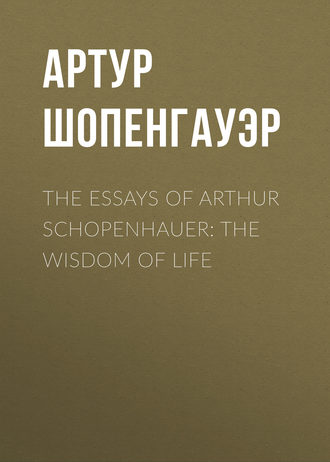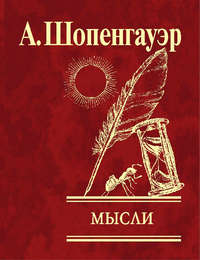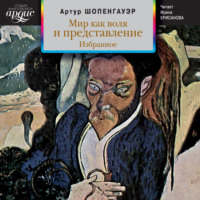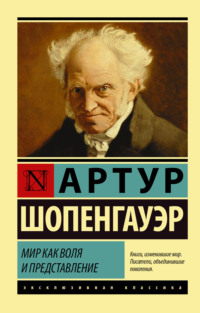 полная версия
полная версияThe Essays of Arthur Schopenhauer: the Wisdom of Life
The kind of honor which I have been discussing hitherto has always existed in its various forms and principles amongst all nations and at all times; although the history of female honor shows that its principles have undergone certain local modifications at different periods. But there is another species of honor which differs from this entirely, a species of honor of which the Greeks and Romans had no conception, and up to this day it is perfectly unknown amongst Chinese, Hindoos or Mohammedans. It is a kind of honor which arose only in the Middle Age, and is indigenous only to Christian Europe, nay, only to an extremely small portion of the population, that is to say, the higher classes of society and those who ape them. It is knightly honor, or point d'honneur. Its principles are quite different from those which underlie the kind of honor I have been treating until now, and in some respects are even opposed to them. The sort I am referring to produces the cavalier; while the other kind creates the man of honor. As this is so, I shall proceed to give an explanation of its principles, as a kind of code or mirror of knightly courtesy.
(1.) To begin with, honor of this sort consists, not in other people's opinion of what we are worth, but wholly and entirely in whether they express it or not, no matter whether they really have any opinion at all, let alone whether they know of reasons for having one. Other people may entertain the worst opinion of us in consequence of what we do, and may despise us as much as they like; so long as no one dares to give expression to his opinion, our honor remains untarnished. So if our actions and qualities compel the highest respect from other people, and they have no option but to give this respect, – as soon as anyone, no matter how wicked or foolish he may be, utters something depreciatory of us, our honor is offended, nay, gone for ever, unless we can manage to restore it. A superfluous proof of what I say, namely, that knightly honor depends, not upon what people think, but upon what they say, is furnished by the fact that insults can be withdrawn, or, if necessary, form the subject of an apology, which makes them as though they had never been uttered. Whether the opinion which underlays the expression has also been rectified, and why the expression should ever have been used, are questions which are perfectly unimportant: so long as the statement is withdrawn, all is well. The truth is that conduct of this kind aims, not at earning respect, but at extorting it.
(2.) In the second place, this sort of honor rests, not on what a man does, but on what he suffers, the obstacles he encounters; differing from the honor which prevails in all else, in consisting, not in what he says or does himself, but in what another man says or does. His honor is thus at the mercy of every man who can talk it away on the tip of his tongue; and if he attacks it, in a moment it is gone for ever, – unless the man who is attacked manages to wrest it back again by a process which I shall mention presently, a process which involves danger to his life, health, freedom, property and peace of mind. A man's whole conduct may be in accordance with the most righteous and noble principles, his spirit may be the purest that ever breathed, his intellect of the very highest order; and yet his honor may disappear the moment that anyone is pleased to insult him, anyone at all who has not offended against this code of honor himself, let him be the most worthless rascal or the most stupid beast, an idler, gambler, debtor, a man, in short, of no account at all. It is usually this sort of fellow who likes to insult people; for, as Seneca42 rightly remarks, ut quisque contemtissimus et ludibrio est, ita solutissimae est, the more contemptible and ridiculous a man is, – the readier he is with his tongue. His insults are most likely to be directed against the very kind of man I have described, because people of different tastes can never be friends, and the sight of pre-eminent merit is apt to raise the secret ire of a ne'er-do-well. What Goethe says in the Westöstlicher Divan is quite true, that it is useless to complain against your enemies; for they can never become your friends, if your whole being is a standing reproach to them: —
Was klagst du über Feinde?Sollten Solche je warden FreundeDenen das Wesen, wie du bist,Im stillen ein ewiger Vorwurf ist?It is obvious that people of this worthless description have good cause to be thankful to the principle of honor, because it puts them on a level with people who in every other respect stand far above them. If a fellow likes to insult any one, attribute to him, for example, some bad quality, this is taken prima facie as a well-founded opinion, true in fact; a decree, as it were, with all the force of law; nay, if it is not at once wiped out in blood, it is a judgment which holds good and valid to all time. In other words, the man who is insulted remains – in the eyes of all honorable people– what the man who uttered the insult – even though he were the greatest wretch on earth – was pleased to call him; for he has put up with the insult – the technical term, I believe. Accordingly, all honorable people will have nothing more to do with him, and treat him like a leper, and, it may be, refuse to go into any company where he may be found, and so on.
This wise proceeding may, I think, be traced back to the fact that in the Middle Age, up to the fifteenth century, it was not the accuser in any criminal process who had to prove the guilt of the accused, but the accused who had to prove his innocence.43 This he could do by swearing he was not guilty; and his backers —consacramentales– had to come and swear that in their opinion he was incapable of perjury. If he could find no one to help him in this way, or the accuser took objection to his backers, recourse was had to trial by the Judgment of God, which generally meant a duel. For the accused was now in disgrace,44 and had to clear himself. Here, then, is the origin of the notion of disgrace, and of that whole system which prevails now-a-days amongst honorable people– only that the oath is omitted. This is also the explanation of that deep feeling of indignation which honorable people are called upon to show if they are given the lie; it is a reproach which they say must be wiped out in blood. It seldom comes to this pass, however, though lies are of common occurrence; but in England, more than elsewhere, it is a superstition which has taken very deep root. As a matter of order, a man who threatens to kill another for telling a lie should never have told one himself. The fact is, that the criminal trial of the Middle Age also admitted of a shorter form. In reply to the charge, the accused answered: That is a lie; whereupon it was left to be decided by the Judgment of God. Hence, the code of knightly honor prescribes that, when the lie is given, an appeal to arms follows as a matter of course. So much, then, for the theory of insult.
But there is something even worse than insult, something so dreadful that I must beg pardon of all honorable people for so much as mentioning it in this code of knightly honor; for I know they will shiver, and their hair will stand on end, at the very thought of it – the summum malum, the greatest evil on earth, worse than death and damnation. A man may give another —horrible dictu! – a slap or a blow. This is such an awful thing, and so utterly fatal to all honor, that, while any other species of insult may be healed by blood-letting, this can be cured only by the coup-de-grace.
(3.) In the third place, this kind of honor has absolutely nothing to do with what a man may be in and for himself; or, again, with the question whether his moral character can ever become better or worse, and all such pedantic inquiries. If your honor happens to be attacked, or to all appearances gone, it can very soon be restored in its entirety if you are only quick enough in having recourse to the one universal remedy —a duel. But if the aggressor does not belong to the classes which recognize the code of knightly honor, or has himself once offended against it, there is a safer way of meeting any attack upon your honor, whether it consists in blows, or merely in words. If you are armed, you can strike down your opponent on the spot, or perhaps an hour later. This will restore your honor.
But if you wish to avoid such an extreme step, from fear of any unpleasant consequences arising therefrom, or from uncertainty as to whether the aggressor is subject to the laws of knightly honor or not, there is another means of making your position good, namely, the Avantage. This consists in returning rudeness with still greater rudeness; and if insults are no use, you can try a blow, which forms a sort of climax in the redemption of your honor; for instance, a box on the ear may be cured by a blow with a stick, and a blow with a stick by a thrashing with a horsewhip; and, as the approved remedy for this last, some people recommend you to spit at your opponent.45 If all these means are of no avail, you must not shrink from drawing blood. And the reason for these methods of wiping out insult is, in this code, as follows:
(4.) To receive an insult is disgraceful; to give one, honorable. Let me take an example. My opponent has truth, right and reason on his side. Very well. I insult him. Thereupon right and honor leave him and come to me, and, for the time being, he has lost them – until he gets them back, not by the exercise of right or reason, but by shooting and sticking me. Accordingly, rudeness is a quality which, in point of honor, is a substitute for any other and outweighs them all. The rudest is always right. What more do you want? However stupid, bad or wicked a man may have been, if he is only rude into the bargain, he condones and legitimizes all his faults. If in any discussion or conversation, another man shows more knowledge, greater love of truth, a sounder judgment, better understanding than we, or generally exhibits intellectual qualities which cast ours into the shade, we can at once annul his superiority and our own shallowness, and in our turn be superior to him, by being insulting and offensive. For rudeness is better than any argument; it totally eclipses intellect. If our opponent does not care for our mode of attack, and will not answer still more rudely, so as to plunge us into the ignoble rivalry of the Avantage, we are the victors and honor is on our side. Truth, knowledge, understanding, intellect, wit, must beat a retreat and leave the field to this almighty insolence.
Honorable people immediately make a show of mounting their war-horse, if anyone utters an opinion adverse to theirs, or shows more intelligence than they can muster; and if in any controversy they are at a loss for a reply, they look about for some weapon of rudeness, which will serve as well and come readier to hand; so they retire masters of the position. It must now be obvious that people are quite right in applauding this principle of honor as having ennobled the tone of society. This principle springs from another, which forms the heart and soul of the entire code.
(5.) Fifthly, the code implies that the highest court to which a man can appeal in any differences he may have with another on a point of honor is the court of physical force, that is, of brutality. Every piece of rudeness is, strictly speaking, an appeal to brutality; for it is a declaration that intellectual strength and moral insight are incompetent to decide, and that the battle must be fought out by physical force – a struggle which, in the case of man, whom Franklin defines as a tool-making animal, is decided by the weapons peculiar to the species; and the decision is irrevocable. This is the well-known principle of right of might– irony, of course, like the wit of a fool, a parallel phrase. The honor of a knight may be called the glory of might.
(6.) Lastly, if, as we saw above, civic honor is very scrupulous in the matter of meum and tuum, paying great respect to obligations and a promise once made, the code we are here discussing displays, on the other hand, the noblest liberality. There is only one word which may not be broken, the word of honor– upon my honor, as people say – the presumption being, of course, that every other form of promise may be broken. Nay, if the worst comes to the worst, it is easy to break even one's word of honor, and still remain honorable – again by adopting that universal remedy, the duel, and fighting with those who maintain that we pledged our word. Further, there is one debt, and one alone, that under no circumstances must be left unpaid – a gambling debt, which has accordingly been called a debt of honor. In all other kinds of debt you may cheat Jews and Christians as much as you like; and your knightly honor remains without a stain.
The unprejudiced reader will see at once that such a strange, savage and ridiculous code of honor as this has no foundation in human nature, nor any warrant in a healthy view of human affairs. The extremely narrow sphere of its operation serves only to intensify the feeling, which is exclusively confined to Europe since the Middle Age, and then only to the upper classes, officers and soldiers, and people who imitate them. Neither Greeks nor Romans knew anything of this code of honor or of its principles; nor the highly civilized nations of Asia, ancient or modern. Amongst them no other kind of honor is recognized but that which I discussed first, in virtue of which a man is what he shows himself to be by his actions, not what any wagging tongue is pleased to say of him. They thought that what a man said or did might perhaps affect his own honor, but not any other man's. To them, a blow was but a blow – and any horse or donkey could give a harder one – a blow which under certain circumstances might make a man angry and demand immediate vengeance; but it had nothing to do with honor. No one kept account of blows or insulting words, or of the satisfaction which was demanded or omitted to be demanded. Yet in personal bravery and contempt of death, the ancients were certainly not inferior to the nations of Christian Europe. The Greeks and Romans were thorough heroes, if you like; but they knew nothing about point d'honneur. If they had any idea of a duel, it was totally unconnected with the life of the nobles; it was merely the exhibition of mercenary gladiators, slaves devoted to slaughter, condemned criminals, who, alternately with wild beasts, were set to butcher one another to make a Roman holiday. When Christianity was introduced, gladiatorial shows were done away with, and their place taken, in Christian times, by the duel, which was a way of settling difficulties by the Judgment of God.
If the gladiatorial fight was a cruel sacrifice to the prevailing desire for great spectacles, dueling is a cruel sacrifice to existing prejudices – a sacrifice, not of criminals, slaves and prisoners, but of the noble and the free.46
There are a great many traits in the character of the ancients which show that they were entirely free from these prejudices. When, for instance, Marius was summoned to a duel by a Teutonic chief, he returned answer to the effect that, if the chief were tired of his life, he might go and hang himself; at the same time he offered him a veteran gladiator for a round or two. Plutarch relates in his life of Themistocles that Eurybiades, who was in command of the fleet, once raised his stick to strike him; whereupon Themistocles, instead of drawing his sword, simply said: Strike, but hear me. How sorry the reader must be, if he is an honorable man, to find that we have no information that the Athenian officers refused in a body to serve any longer under Themistocles, if he acted like that! There is a modern French writer who declares that if anyone considers Demosthenes a man of honor, his ignorance will excite a smile of pity; and that Cicero was not a man of honor either!47 In a certain passage in Plato's Laws48 the philosopher speaks at length of [Greek: aikia] or assault, showing us clearly enough that the ancients had no notion of any feeling of honor in connection with such matters. Socrates' frequent discussions were often followed by his being severely handled, and he bore it all mildly. Once, for instance, when somebody kicked him, the patience with which he took the insult surprised one of his friends. Do you think, said Socrates, that if an ass happened to kick me, I should resent it?49 On another occasion, when he was asked, Has not that fellow abused and insulted you? No, was his answer, what he says is not addressed to me50 Stobaeus has preserved a long passage from Musonius, from which we can see how the ancients treated insults. They knew no other form of satisfaction than that which the law provided, and wise people despised even this. If a Greek received a box on the ear, he could get satisfaction by the aid of the law; as is evident from Plato's Gorgias, where Socrates' opinion may be found. The same thing may be seen in the account given by Gellius of one Lucius Veratius, who had the audacity to give some Roman citizens whom he met on the road a box on the ear, without any provocation whatever; but to avoid any ulterior consequences, he told a slave to bring a bag of small money, and on the spot paid the trivial legal penalty to the men whom he had astonished by his conduct.
Crates, the celebrated Cynic philosopher, got such a box on the ear from Nicodromus, the musician, that his face swelled up and became black and blue; whereupon he put a label on his forehead, with the inscription, Nicodromus fecit, which brought much disgrace to the fluteplayer who had committed such a piece of brutality upon the man whom all Athens honored as a household god.51 And in a letter to Melesippus, Diogenes of Sinope tells us that he got a beating from the drunken sons of the Athenians; but he adds that it was a matter of no importance.52 And Seneca devotes the last few chapters of his De Constantia to a lengthy discussion on insult —contumelia; in order to show that a wise man will take no notice of it. In Chapter XIV, he says, What shall a wise man do, if he is given a blow? What Cato did, when some one struck him on the mouth; – not fire up or avenge the insult, or even return the blow, but simply ignore it.
Yes, you say, but these men were philosophers. – And you are fools, eh? Precisely.
It is clear that the whole code of knightly honor was utterly unknown to the ancients; for the simple reason that they always took a natural and unprejudiced view of human affairs, and did not allow themselves to be influenced by any such vicious and abominable folly. A blow in the face was to them a blow and nothing more, a trivial physical injury; whereas the moderns make a catastrophe out of it, a theme for a tragedy; as, for instance, in the Cid of Corneille, or in a recent German comedy of middle-class life, called The Power of Circumstance, which should have been entitled The Power of Prejudice. If a member of the National Assembly at Paris got a blow on the ear, it would resound from one end of Europe to the other. The examples which I have given of the way in which such an occurrence would have been treated in classic times may not suit the ideas of honorable people; so let me recommend to their notice, as a kind of antidote, the story of Monsieur Desglands in Diderot's masterpiece, Jacques le fataliste. It is an excellent specimen of modern knightly honor, which, no doubt, they will find enjoyable and edifying.53
From what I have said it must be quite evident that the principle of knightly honor has no essential and spontaneous origin in human nature. It is an artificial product, and its source is not hard to find. Its existence obviously dates from the time when people used their fists more than their heads, when priestcraft had enchained the human intellect, the much bepraised Middle Age, with its system of chivalry. That was the time when people let the Almighty not only care for them but judge for them too; when difficult cases were decided by an ordeal, a Judgment of God; which, with few exceptions, meant a duel, not only where nobles were concerned, but in the case of ordinary citizens as well. There is a neat illustration of this in Shakespeare's Henry VI. Every judicial sentence was subject to an appeal to arms – a court, as it were, of higher instance, namely, the Judgment of God: and this really meant that physical strength and activity, that is, our animal nature, usurped the place of reason on the judgment seat, deciding in matters of right and wrong, not by what a man had done, but by the force with which he was opposed, the same system, in fact, as prevails to-day under the principles of knightly honor. If any one doubts that such is really the origin of our modern duel, let him read an excellent work by J.B. Millingen, The History of Dueling. Nay, you may still find amongst the supporters of the system, – who, by the way are not usually the most educated or thoughtful of men, – some who look upon the result of a duel as really constituting a divine judgment in the matter in dispute; no doubt in consequence of the traditional feeling on the subject.
But leaving aside the question of origin, it must now be clear to us that the main tendency of the principle is to use physical menace for the purpose of extorting an appearance of respect which is deemed too difficult or superfluous to acquire in reality; a proceeding which comes to much the same thing as if you were to prove the warmth of your room by holding your hand on the thermometer and so make it rise. In fact, the kernel of the matter is this: whereas civic honor aims at peaceable intercourse, and consists in the opinion of other people that we deserve full confidence, because we pay unconditional respect to their rights; knightly honor, on the other hand, lays down that we are to be feared, as being determined at all costs to maintain our own.
As not much reliance can be placed upon human integrity, the principle that it is more essential to arouse fear than to invite confidence would not, perhaps, be a false one, if we were living in a state of nature, where every man would have to protect himself and directly maintain his own rights. But in civilized life, where the State undertakes the protection of our person and property, the principle is no longer applicable: it stands, like the castles and watch-towers of the age when might was right, a useless and forlorn object, amidst well-tilled fields and frequented roads, or even railways.
Accordingly, the application of knightly honor, which still recognizes this principle, is confined to those small cases of personal assault which meet with but slight punishment at the hands of the law, or even none at all, for de minimis non, – mere trivial wrongs, committed sometimes only in jest. The consequence of this limited application of the principle is that it has forced itself into an exaggerated respect for the value of the person, – a respect utterly alien to the nature, constitution or destiny of man – which it has elated into a species of sanctity: and as it considers that the State has imposed a very insufficient penalty on the commission of such trivial injuries, it takes upon itself to punish them by attacking the aggressor in life or limb. The whole thing manifestly rests upon an excessive degree of arrogant pride, which, completely forgetting what man really is, claims that he shall be absolutely free from all attack or even censure. Those who determine to carry out this principle by main force, and announce, as their rule of action, whoever insults or strikes me shall die! ought for their pains to be banished the country.54
As a palliative to this rash arrogance, people are in the habit of giving way on everything. If two intrepid persons meet, and neither will give way, the slightest difference may cause a shower of abuse, then fisticuffs, and, finally, a fatal blow: so that it would really be a more decorous proceeding to omit the intermediate steps and appeal to arms at once. An appeal to arms has its own special formalities; and these have developed into a rigid and precise system of laws and regulations, together forming the most solemn farce there is – a regular temple of honor dedicated to folly! For if two intrepid persons dispute over some trivial matter, (more important affairs are dealt with by law), one of them, the cleverer of the two, will of course yield; and they will agree to differ. That this is so is proved by the fact that common people, – or, rather, the numerous classes of the community who do not acknowledge the principle of knightly honor, let any dispute run its natural course. Amongst these classes homicide is a hundredfold rarer than amongst those – and they amount, perhaps, in all, to hardly one in a thousand, – who pay homage to the principle: and even blows are of no very frequent occurrence.









